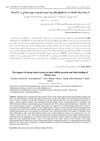 February 2024 in “BioMetals”
February 2024 in “BioMetals” Heavy metals like arsenic, cadmium, and lead can increase cancer risk and worsen outcomes.
 3 citations,
May 2014 in “InTech eBooks”
3 citations,
May 2014 in “InTech eBooks” Copper deficiency may cause hair loss, and treating it could involve nutrition and hormones.
[object Object] 5 citations,
July 2022 in “Genes” Increasing EGR1 levels makes hair root cells grow faster.
 January 2002 in “Journal of Toxicology-cutaneous and Ocular Toxicology”
January 2002 in “Journal of Toxicology-cutaneous and Ocular Toxicology” Botanical extracts are increasingly important in cosmetics and drugs for their effectiveness and safety, backed by traditional use and scientific evidence.
1 citations,
August 2024 in “Cosmetics” Melasma treatment is difficult, but combination therapies and personalized plans show promise.
 September 2023 in “Frontiers in medicine”
September 2023 in “Frontiers in medicine” The mTOR signaling pathway is crucial for hair health and targeting it may lead to new hair loss treatments.
 March 2024 in “PLoS medicine”
March 2024 in “PLoS medicine” Physical activity, height, and smoking affect prostate cancer risk.
 45 citations,
April 2018 in “Nature Reviews Urology”
45 citations,
April 2018 in “Nature Reviews Urology” Male genital development is driven by androgen signaling and understanding it could help address congenital anomalies.
 18 citations,
December 2010 in “Journal of Trace Elements in Medicine and Biology”
18 citations,
December 2010 in “Journal of Trace Elements in Medicine and Biology” Women with AGA have more androstenedione and dihydrotestosterone, less copper and zinc; copper imbalance affects AGA; treatment improves hormones and minerals.
14 citations,
July 2017 in “Pakistan Journal of Zoology” Fenugreek leaf extracts significantly promoted hair growth in mice with alopecia.
 January 2017 in “Springer eBooks”
January 2017 in “Springer eBooks” Eating a balanced diet with specific nutrients can help manage menopause symptoms and prevent related health issues.
 1 citations,
March 2018 in “bioRxiv (Cold Spring Harbor Laboratory)”
1 citations,
March 2018 in “bioRxiv (Cold Spring Harbor Laboratory)” The hair treatment made hair grow faster and thicker and strengthened the hair roots.
110 citations,
April 2020 in “Advances in Wound Care” Nanotechnology shows promise for better chronic wound healing but needs more research.
 1 citations,
November 2015 in “Lʹvìvsʹkij klìnìčnij vìsnik”
1 citations,
November 2015 in “Lʹvìvsʹkij klìnìčnij vìsnik” Correcting trace element imbalances may help reduce alopecia areata symptoms.
 95 citations,
February 2018 in “Dermatology and Therapy”
95 citations,
February 2018 in “Dermatology and Therapy” Nutraceuticals may improve skin health and protect against aging, but more research is needed on their optimal use and possible health risks.
 August 2016 in “Journal of Investigative Dermatology”
August 2016 in “Journal of Investigative Dermatology” Zinc deficiency disrupts hair growth and cycle, but zinc supplements can fix this.
 1 citations,
October 2023 in “The Journal of nutrition, health & aging”
1 citations,
October 2023 in “The Journal of nutrition, health & aging” Higher hair levels of zinc and chromium were linked to less cognitive decline in very old people.
[object Object]  1 citations,
November 2023 in “Journal of ovarian research”
1 citations,
November 2023 in “Journal of ovarian research” Agaricus subrufescens improves ovarian function and biochemical health in rats with PCOS.
 July 2023 in “bioRxiv (Cold Spring Harbor Laboratory)”
July 2023 in “bioRxiv (Cold Spring Harbor Laboratory)” Chitosan slows root hair growth and causes a buildup of callose at low concentrations, but at high concentrations, it only inhibits growth without callose buildup.
 1 citations,
June 2016 in “Yāftah/hā-yi nuvīn dar ̒ulūm-i zīstī”
1 citations,
June 2016 in “Yāftah/hā-yi nuvīn dar ̒ulūm-i zīstī” Sheep testis extract significantly improves wound healing and hair growth in rats.
 68 citations,
September 2018 in “International Journal of Molecular Sciences”
68 citations,
September 2018 in “International Journal of Molecular Sciences” Air pollution (PM10) increases skin inflammation and aging by reducing collagen and may trigger a repair response in skin cells.
 3 citations,
January 2019 in “Elsevier eBooks”
3 citations,
January 2019 in “Elsevier eBooks” Pharmacists should interpret lab data and perform physical exams to improve patient care.
March 2021 in “World rabbit science” Adding 0.2% taurine to Angora rabbits' diet improves wool production and overall health.
 16 citations,
September 2018 in “Journal of Molecular Liquids”
16 citations,
September 2018 in “Journal of Molecular Liquids” The PS-b-PAA copolymer nanomicelles are effective for delivering a cancer treatment drug in photodynamic therapy.
 46 citations,
October 2012 in “Dermatologic Clinics”
46 citations,
October 2012 in “Dermatologic Clinics” Female pattern hair loss diagnosed by scalp appearance, treated with combined therapies and targeted approaches.
 67 citations,
September 2003 in “Journal of cutaneous pathology”
67 citations,
September 2003 in “Journal of cutaneous pathology” Skin problems are very common in people with end-stage kidney disease.
 June 2024 in “International Journal of Nanomedicine”
June 2024 in “International Journal of Nanomedicine” CRISPR/Cas9 has improved precision and control but still faces clinical challenges.
 December 2020 in “Revista da Sociedade Portuguesa de Dermatologia e Venereologia”
December 2020 in “Revista da Sociedade Portuguesa de Dermatologia e Venereologia” The document's conclusion cannot be summarized because the content is not accessible or understandable.
 67 citations,
November 2019 in “Molecules”
67 citations,
November 2019 in “Molecules” Tea, especially green tea, shows promise in cosmetics for skin and hair benefits but more research is needed for effective use.
 July 2023 in “International Journal of Endocrinology”
July 2023 in “International Journal of Endocrinology” Centratherum anthelminticum seed extract effectively treats Polycystic Ovary Syndrome in rats.

























